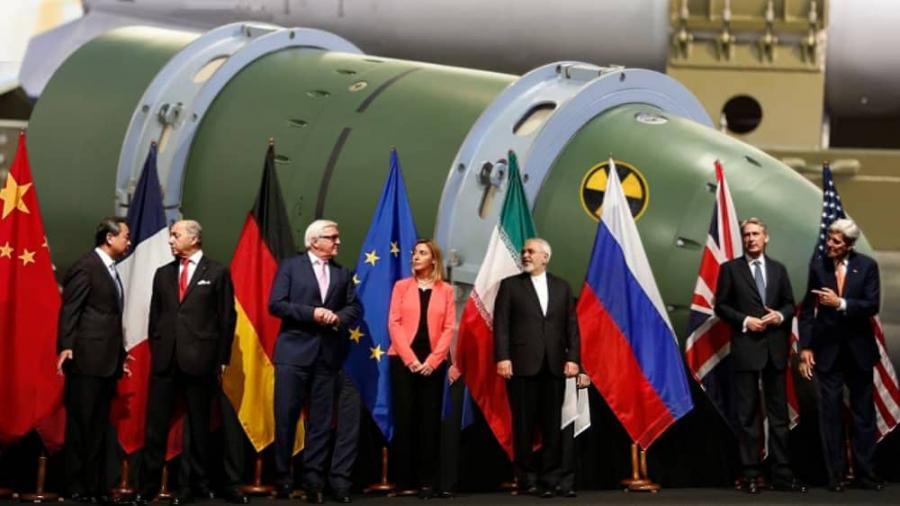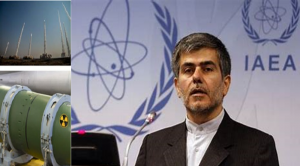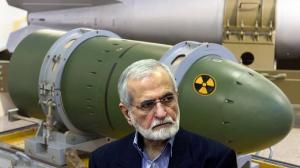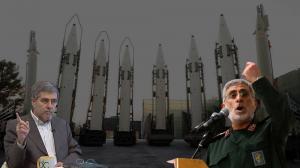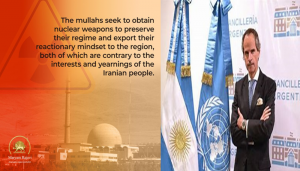
(Video) Iran’s Nuclear Program: Appeasement Backfires
Now the Iranian regime’s nuclear program has reached a critical juncture, as recent developments underscore the nation’s progress in obtaining nuclear weapons.
PARIS, FRANCE, May 28, 2024 /EINPresswire.com/ -- The National Council of Resistance of Iran (NCRI) Foreign Affairs Committee in an article reported that a significant yet unsurprising report by Reuters on May 24 revealed that the United States is actively opposing a European-led resolution ahead of the International Atomic Energy Agency (IAEA) Board of Governors meeting on Iran. This resolution seeks to censure the Iranian regime for its perilous nuclear advancements and failure to cooperate with the IAEA.
The U.S. opposition to this resolution has sparked a debate over the potential motivations behind such an appeasement strategy, particularly amidst growing concerns over Iran’s nuclear ambitions and the international community’s efforts to curtail them.
Iran’s nuclear program has been a subject of international scrutiny and concern for more than 20 years. Decades-long negotiations, lucrative incentive packages, security guarantees, political and economic concessions, and meetings at all levels have failed to bring the regime into compliance with international treaties. Instead, Tehran has persistently advanced its nuclear capabilities.
Furthermore, Tehran’s public claims of its program being “for peaceful and scientific purposes” are contradicted by its consistent non-compliance and obstruction.
The regime’s cat-and-mouse game with the UN nuclear watchdog, including obstructing its monitoring capabilities, demolishing nuclear sites before inspection, refusing to clarify suspicious traces in locations requested by the IAEA, and obfuscating evidence of nuclear activities, speaks volumes about Tehran’s disregard for international treaties and global efforts to safeguard peace and security. Reports by the IAEA, as well as numerous think tanks and professional study groups, highlight hundreds of instances of Iran’s duplicity.
Contrary to what some Iran apologists suggest, Iranian officials have admitted that the regime has continued its nuclear program clandestinely, even as the world believed it had halted its activities under the Joint Comprehensive Plan of Action (JCPOA).
The Iranian Resistance, notably the National Council of Resistance of Iran (NCRI), has long been a vocal critic of the regime’s nuclear ambitions.
The NCRI has persistently warned the international community about Iran’s clandestine nuclear activities and has provided critical intelligence on the regime’s illicit advancements. A timeline provided by the NCRI outlines numerous revelations over the years that have exposed the dimensions of Iran’s nuclear sites and underground facilities.
These revelations have often preempted official reports from international bodies, underscoring the resistance’s significant role in highlighting the regime’s nuclear threat. The NCRI’s disclosures have been pivotal in keeping the global community informed about the true extent of Iran’s nuclear program, often prompting further inspections and investigations by the IAEA.
Citing the regime’s uranium enrichment levels above 60% and its use of highly advanced centrifuges, experts and world leaders have speculated on how close Iran is to acquiring nuclear weapons. However, there has been a failure to outline what actions need to be taken to prevent it.
While the US has persistently reiterated its determination to prevent a nuclear-armed Iran, its actions have often undermined this goal. The opposition to the European-led resolution is a case in point.
Historical evidence suggests that appeasement has never led to compliance from the Iranian regime. Instead, it has only emboldened Tehran to further its nuclear ambitions. The regime has demonstrated a pattern of leveraging negotiations and international leniency to buy time and advance its nuclear capabilities.
Recent statements and actions by the Iranian regime indicate that Tehran is already justifying its status as a nuclear threshold state. Officials frequently use state media to suggest that Iran might change its nuclear doctrine, that the Supreme Leader’s fatwa prohibiting nuclear bombs is subject to revision, or even hint that Tehran already possesses a nuclear weapon and prefers to remain silent about it. This rhetoric aligns perfectly with Iran’s history of atomic blackmail, encouraged by the weak response it receives from the West.
Two decades of persistence in advancing its nuclear program, feet-dragging in negotiations, violation of JCPOA commitments, and deceiving the IAEA have met with an indefatigable, indestructible, and inexhaustible pursuit by the West to achieve what they never will: getting Tehran to forgo its strategic survival mechanism.
If two decades of failed policy can’t help Western capitals understand the devastating consequences of their wishful thinking, perhaps the economic instability and socio-political consequences arising from four decades of unabated Islamist fundamentalism indicate what a nuclear-armed Iran can unleash.
Continuing a series of nuclear threats by Iranian regime officials, Fereydoon Abbasi, a member of the parliament’s Energy Commission and former head of the regime’s Atomic Energy Organization, has threatened the use of nuclear weapons.
In an interview with the state-run website Rouydad24, Abbasi stated, “We do not believe in weapons of mass destruction, but it is unacceptable for those who possess such weapons to misuse their power. Everyone is aware that we can launch satellites, and a country that can launch satellites and place them in specific orbits possesses high standards.”
In a rebuke to Rafael Grossi, the Director General of the International Atomic Energy Agency (IAEA), he said, “Iran’s nuclear doctrine is not fixed. However, the IAEA has proven that it is not an independent institution. Although Iran does not believe in weapons of mass destruction, it is unacceptable for those who possess such weapons to misuse their power.”
He added, “Nuclear weapons have two main prerequisites: material and technology. Our opponents have known for years that we can produce materials and are technologically advanced. Those who are knowledgeable understand what I am saying.”
In an interview with The Guardian published on May 14, Rafael Grossi had urged Tehran to refrain from nuclear weapons threats in their rhetoric.
In recent weeks, various officials within the Iranian regime have engaged in nuclear blackmail. Kamal Kharrazi, a senior advisor to Supreme Leader Khamenei and former foreign minister, has repeatedly threatened the regime might be compelled to change its nuclear doctrine.
Additionally, Ahmad Bakhshayesh, a former member of parliament, stated that he believes the Iranian regime already possesses nuclear weapons but does not wish to announce it.
Meanwhile, Esmail Qaani, commander of the Quds Force of the Islamic Revolutionary Guard Corps IRGC, threatened three European countries, saying, “All criminals should know that their actions and crimes are noted. France, Germany, and the UK should not think that the night they came and brought their planes, the matter was over and done with. Yes, that night is now over, but their account has not been settled with us.”
He made these remarks on Wednesday, May 15, during a ceremony commemorating Mohammad Hadi Haj-Rahimi, a Quds Force commander killed in Syria. Qaani stated, “The Zionist regime, the United States, and all of the West are too insignificant to stand against the Resistance Front. This is not just a slogan; it has been proven in practice, and they acknowledge it.”
Mohammad Hadi Haj-Rahimi was killed on April 1 in an Israeli attack on the consulate building of the clerical regime, along with Mohammad Reza Zahedi, the IRGC commander in Syria and Lebanon, and five other Islamic Revolutionary Guards Corps (IRGC) members.
Following the attack, the Iranian regime faced internal pressure to avenge the deaths of its senior commanders. Consequently, 12 days later, the regime carried out an operation named “Vade-e Sadeq” (Arabic for Honest Oath), during which 331 drones, cruise missiles, and ballistic missiles were launched from Iran towards Israel. Senior regime officials, including Foreign Minister Hossein Amir-Abdollahian, later admitted that the targeted parties had been informed of the attack in advance.
Reports following the attack indicated that Israel, in collaboration with the United States, the United Kingdom, France, Jordan, Saudi Arabia, and the United Arab Emirates, successfully intercepted and destroyed a great portion of the missiles and drones launched by the IRGC. Many experts deemed the missile and drone attacks by Tehran a military failure, and public opinion in Iran focused on the IRGC’s incapacity in this operation.
However, Qaani also issued veiled threats to Iran’s neighbors, stating, “Some regional leaders who rely on the United States should consider whether America will defend them more than it does the Zionist regime.”
The leading state sponsor of global terrorism feels threatened due to its growing regional and international isolation. Hence, it seeks to compensate for its inherent weaknesses and the confluence of domestic problems by resorting to terrorism or the threats thereof through nuclear and missile intimidations. Yet, if the past is prologue, the only thing that can deter this regime from executing its rhetoric is resolute and decisive action.
Now the Iranian regime’s nuclear program has reached a critical juncture, as recent developments underscore the nation’s progress toward obtaining nuclear weapons.
On November 15, Reuters reported that Iran possesses enough uranium enriched up to 60% purity, nearing weapons-grade levels, for the production of three atomic bombs, according to the International Atomic Energy Agency’s definition. Iran continues to withhold critical information from the agency on key issues.
The stock of uranium enriched up to 60% has increased by 6.7 kg, reaching 128.3 kg since the last report on September 4, as indicated in one of the two reports seen by Reuters.
This amount is over three times the approximately 42 kg, which, by the IAEA’s definition, is theoretically sufficient, if further enriched, to produce a nuclear bomb. This acceleration in uranium enrichment poses a grave threat to regional and global security.
The IAEA’s list of pressing issues with Iran has expanded, showcasing a lack of cooperation from the Iranian regime. Despite a March agreement to reinstall monitoring equipment, only partial compliance has been observed.
Furthermore, the Iranian regime’s “de-designation” of highly experienced IAEA inspectors in September has raised concerns about the effectiveness of the agency’s verification activities. The lack of progress on these issues, as highlighted in the November reports, underscores the urgency for a more assertive international response.
Western powers, including the United States and its European allies, have exhibited hesitancy in confronting Iran’s nuclear ambitions. The fear of provoking a counter-reaction and the ongoing conflict in the region has hampered the enforcement of concrete measures against the Iranian regime.
This appeasement policy, intended to avoid diplomatic escalation, has emboldened Tehran, allowing it to advance its nuclear program without facing severe consequences.
Despite repeated warnings from the E3 (Britain, France, Germany) and the U.S. in September, the West has refrained from issuing formal condemnations or setting clear deadlines for Iran to comply with the IAEA investigation into Nuclear Non-Proliferation Treaty (NPT) violations. This lack of accountability raises concerns about Iran’s potential to develop nuclear weapons with impunity.
Rafael Grossi, the Director General of the IAEA, has emphasized the gravity of the situation. In an interview with the Financial Times, he underscored the risks associated with Iran’s nuclear activities.
Grossi urged the international community not to lose sight of these risks amid other regional conflicts, highlighting the urgency of addressing Iran’s nuclear advancements.
Iranian regime’s consistent advancements in uranium enrichment, combined with the inadequacy of measures taken by the IAEA and Western powers, pose a significant obstacle to global endeavors aimed at curbing nuclear proliferation.
The lingering question revolves around how the terrorist regime in Iran, persistently disregards and violates international agreements and commitments.
The explanation can be traced back to the continuous adoption of appeasement policies by Western nations, characterized by repeated retreats from their proclaimed red lines and a failure to hold the Iranian regime accountable for its transgressions and atrocities.
Instead of immersing themselves in protracted nuclear negotiations, these nations should have reinstated the six UN Resolutions and activated the snapback mechanism outlined in UNSCR 2231. Such a decisive action would have thwarted the ambitions of the world’s most active state sponsor of global terrorism from acquiring the deadliest weapon of mass destruction.
The ongoing tragedies across the region and the persistent turmoil in the Middle East serve as poignant reminders that until decisive action is taken against the epicenter of extremism in Tehran, the region and the world will continue to grapple with a lack of peace and stability.
If you wish to receive the NCRI weekly Newsletter, please use the following link to subscribe: https://bit.ly/3SMgEla.
Shahin Gobadi
NCRI
+33 6 61 65 32 31
email us here
The Iranian Resistance, notably the National Council of Resistance of Iran (NCRI), has long been a vocal critic of the regime’s nuclear ambitions.
EIN Presswire does not exercise editorial control over third-party content provided, uploaded, published, or distributed by users of EIN Presswire. We are a distributor, not a publisher, of 3rd party content. Such content may contain the views, opinions, statements, offers, and other material of the respective users, suppliers, participants, or authors.

